6 USE OF ENGLISH Complete the second sentence so that it means the same as the first. Use the words in brackets.
(Hoàn thành câu thứ hai sao cho nghĩa giống như câu thứ nhất. Sử dụng các từ trong ngoặc.)
1 My car is smaller than yours.
My car _________________ (as)
2 There aren't as many people on the beach now.
There _________________ (fewer)
3 Flats are usually cheaper than houses.
Flats _________________. (expensive)
4 The weather is becoming increasingly hot.
The weather ________________. (hotter)
5 We've never stayed in a less spacious hotel room.
This is _________________ (least)
6 As you spend more on the flat, it becomes more valuable.
The _________________ (the)
7 I didn't think the rent would be so high.
The rent _________________(than)
Cấu trúc so sánh hơn với tính từ ngắn: S1 + V + tính từ ngắn + ER + THAN + S2.
Cấu trúc so sánh hơn với tính từ dài: S1 + V + MORE + tính từ dài + THAN + S2.
Cấu trúc so sánh nhất với tính từ ngắn: S1 + V + THE + tính từ ngắn + EST.
Cấu trúc so sánh hơn với tính từ dài: S1 + V + THE MOST + tính từ dài.
Cấu trúc so sánh bằng: S1 + V + AS + tính từ / trạng từ + AS + S2.
Cấu trúc so sánh đồng tiến: The + so sánh hơn + S + V, The + so sánh hơn + S + V.
1 My car is smaller than yours.
(Xe của tôi nhỏ hơn của bạn.)
My car isn’t as big as yours. (as)
(Xe của tôi không lớn bằng của bạn.)
2 There aren't as many people on the beach now.
(Bây giờ không có nhiều người trên bãi biển.)
There are fewer people on the beach now. (fewer)
(Có ít người hơn trên bãi biển bây giờ.)
3 Flats are usually cheaper than houses.
(Căn hộ thường rẻ hơn nhà ở.)
Flats aren’t usually as expensive as houses. (expensive)
(Căn hộ thường không đắt bằng nhà ở.)
4 The weather is becoming increasingly hot.
(Thời tiết ngày càng trở nên nóng bức.)
The weather is getting hotter. (hotter)
(Thời tiết ngày càng nóng hơn.)
5 We've never stayed in a less spacious hotel room.
(Chúng tôi chưa bao giờ ở trong một phòng khách sạn ít rộng rãi hơn.)
This is the least spacious hotel room we've ever stayed in. (least)
(Đây là phòng khách sạn kém rộng rãi nhất mà chúng tôi từng ở.)
6 As you spend more on the flat, it becomes more valuable.
(Khi bạn chi tiêu nhiều hơn cho căn hộ, nó sẽ trở nên có giá trị hơn.)
The more you spend on the flat, the more valuable it becomes. (the)
(Bạn càng chi nhiều tiền cho căn hộ, nó càng trở nên có giá trị.)
7 I didn't think the rent would be so high.
(Tôi không nghĩ tiền thuê nhà lại cao như vậy.)
The rent is higher than I thought. (than)
(Tiền thuê nhà cao hơn tôi nghĩ.)

Các bài tập cùng chuyên đề
3. Complete the dialogue with the comparative or superlative form of the adjectives in brackets.
(Hoàn thành đoạn hội thoại với dạng so sánh hơn hoặc so sánh nhất của các tính từ trong ngoặc.)
6. USE OF ENGLISH Complete the second sentence so that it means the same as the first using the word in brackets and the correct comparative or superlative form.
(Hoàn thành câu thứ hai sao cho nghĩa giống như câu thứ nhất, sử dụng từ trong ngoặc và dạng so sánh hơn hoặc so sánh nhất đúng.)
1. Houses sell less fast in December. (slowly)
(Nhà bán ít nhanh hơn trong tháng 12.)
Houses ________________________________________
2. The cottage isn't as spacious as the villa. (less)
(Ngôi nhà không rộng rãi như biệt thự.)
The cottage ________________________________________
3. Houses are becoming increasingly expensive. (more)
(Những ngôi nhà ngày càng trở nên đắt đỏ.)
Houses ________________________________________
4. As the flat gets older, it becomes more dilapidated. (the)
(Khi căn hộ cũ đi, nó trở nên dột nát hơn.)
The ________________________________________
5. I've never seen a cosier living room! (the)
(Tôi chưa bao giờ thấy một phòng khách ấm cúng hơn!)
This is ________________________________________
RECYCLE! Comparison
a Key forms:
kinder- the kindest
more practical- the most practical
less sociable-the least sociable
(not) as intelligent as
b We use double comparatives to say that something is changing.
You're getting more and more impatient!
c We use the... the and comparatives to say that one thing changes with another.
The more arrogant you are, the less popular you'll be.
(RECYCLE! so sánh
a Các hình thức chính:
tốt bụng hơn- tốt bụng nhất
thực tế hơn- thiết thực nhất
ít hòa đồng hơn -ít hòa đồng nhất
(không) thông minh như
b. Chúng ta sử dụng so sánh kép để nói rằng một cái gì đó đang thay đổi.
Bạn càng ngày càng thiếu kiên nhẫn!
c Chúng ta sử dụng the...the và so sánh hơn để nói rằng một thứ thay đổi theo một thứ khác.
Bạn càng kiêu ngạo, bạn sẽ càng ít nổi tiếng hơn.)
6 Read the Recycle! box. Complete the sentences with the correct form of the adjectives in brackets. Then listen again and check.
(Đọc khung RECYCLE! Hoàn thành các câu với dạng đúng của tính từ trong ngoặc. Sau đó nghe lại và kiểm tra.)
Dialogue 1
1 The ______________ (sympathetic) you are, the (good) you'll be at the job.
2 I don't think idealism is ______________ (useful) as patience.
3 These days they have to work ______________ and______________ (long) hours.
Dialogue 2
4 I think that ______________ (important) quality is punctuality.
5 You'll certainly be______________ (popular) if you can laugh at things.
Dialogue 3
6 I think patience is less ______________ (important) physical courage.
7 Which do you think is______________(useful) quality of the three?
4.1 Comparison
(So sánh)
The comparative and superlative forms of adjectives and adverbs with one syllable are formed by adding -er or -est. The same is true of adjectives with two syllables ending in -y.
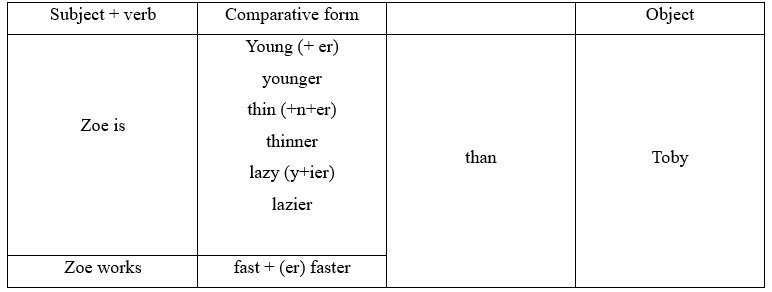
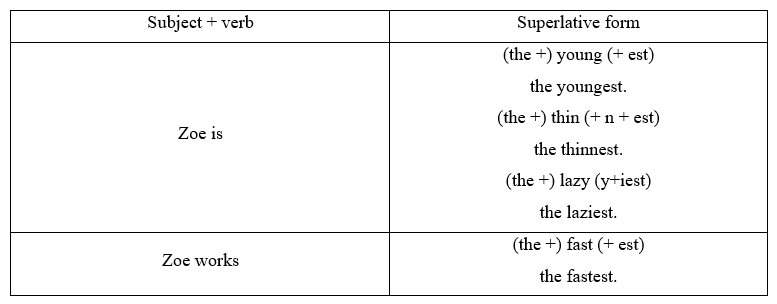
The comparative and superlative forms of adjectives and adverbs with two syllables or more are formed by putting more or the most before the adjective or adverb.


We can also form comparatives and superlatives of adjectives and adverbs with less and the least.
Less is the opposite of more. Least is the opposite of most.
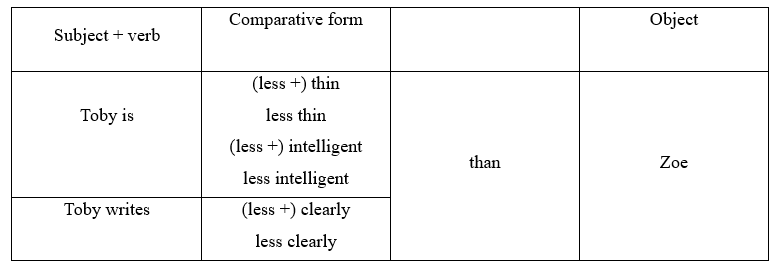

We can use less and least with uncountable nouns.
I've got less spare time than you.
Who's got the least money?
We often use of after superlative adjectives.
Jamie is the smallest of the three brothers.
But we use in, not of, with a group or place (e.g. the world, the class, London).
the best café in Oxford
the most intelligent boy in the class
the longest river in Africa
We can make comparisons with clauses as well as with nouns.
Gemma is more intelligent than you think.
The weather is hotter than it was last week.
We often use a superlative with the present perfect and ever.
Alex has got the biggest dog I've ever seen!
We can compare two things, using (not) as... as.
Julie is as tall as Mike. (= They are the same height.)
Leah isn't as tall as Joe. (= Joe is taller.)
We use double comparatives to emphasise that something is changing.
The weather is getting hotter and hotter.
We use the... the and comparatives to say that one thing changes with another.
The more carefully you check your work, the fewer mistakes you'll make.
Remember irregular comparative and superlative forms.
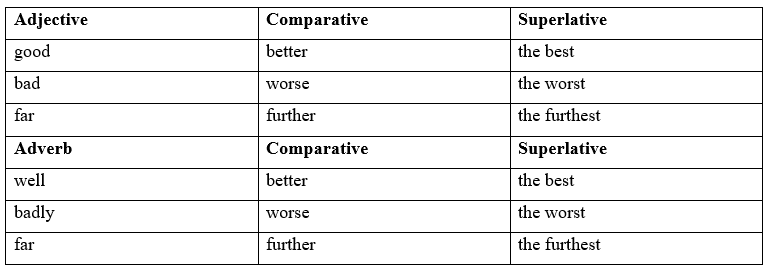
Tạm dịch
Dạng so sánh hơn và so sánh nhất của tính từ và trạng từ có một âm tiết được thành lập bằng cách thêm -er hoặc -est. Điều này cũng đúng với tính từ có hai âm tiết kết thúc bằng -y.
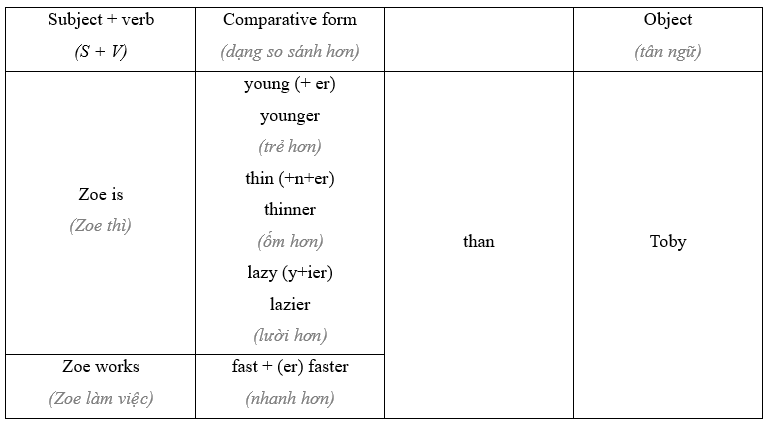
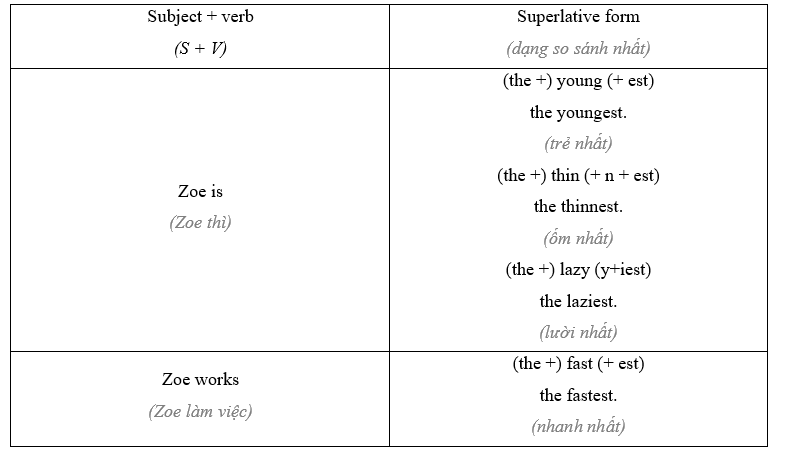
Dạng so sánh hơn và so sánh nhất của tính từ và trạng từ có hai âm tiết trở lên được hình thành bằng cách đặt more hoặc the most trước tính từ hoặc trạng từ.
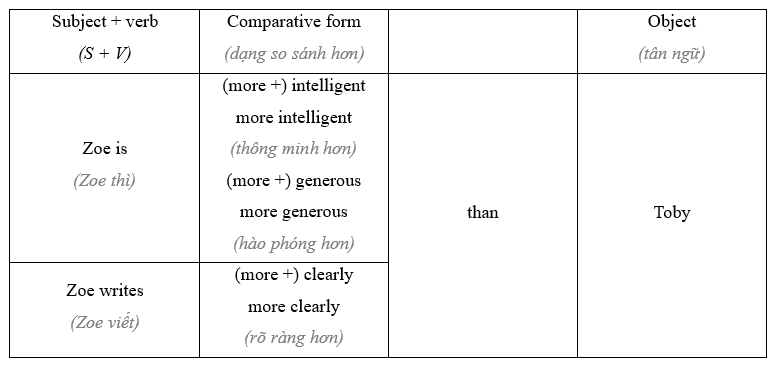
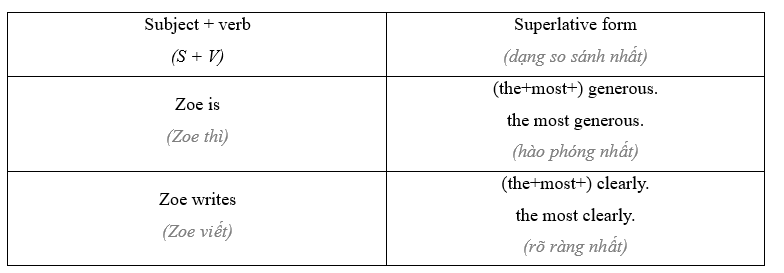
Chúng ta cũng có thể hình thành dạng so sánh hơn và so sánh nhất của tính từ và trạng từ với less và the least.
Ít hơn “less” là ngược lại với nhiều hơn “more”. Ít nhất “the least” là trái nghĩa của hầu hết “the most”.
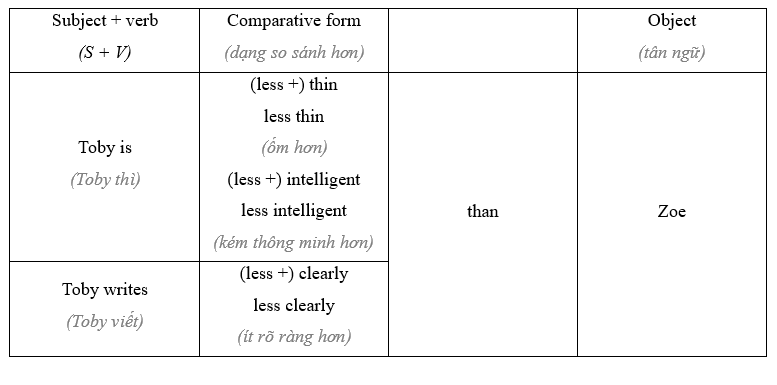
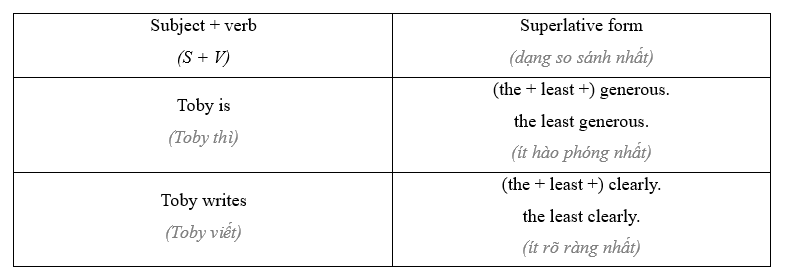
Chúng ta có thể dùng less và least với danh từ không đếm được.
Tôi có ít thời gian rảnh rỗi hơn bạn.
Ai là người có ít tiền nhất?
Chúng ta thường dùng of sau tính từ so sánh nhất.
Jamie là người nhỏ nhất trong ba anh em.
Nhưng chúng ta dùng in, not of, với một nhóm hoặc địa điểm (ví dụ: the world, the class, London).
quán cà phê tốt nhất ở Oxford
cậu bé thông minh nhất trong lớp
con sông dài nhất ở châu Phi
Chúng ta có thể so sánh với mệnh đề cũng như với danh từ.
Gemma thông minh hơn bạn nghĩ.
Thời tiết nóng hơn so với tuần trước.
Chúng ta thường dùng so sánh nhất với thì hiện tại hoàn thành và từ trước đến nay.
Alex có con chó lớn nhất mà tôi từng thấy!
Chúng ta có thể so sánh hai thứ bằng cách sử dụng (not) as... as.
Julie cao bằng Mike. (= Họ có cùng chiều cao.)
Leah không cao bằng Joe. (= Joe cao hơn.)
Chúng tôi sử dụng so sánh kép để nhấn mạnh rằng một cái gì đó đang thay đổi.
Thời tiết ngày càng nóng hơn.
Chúng ta sử dụng the... the và so sánh hơn để nói rằng một thứ thay đổi theo một thứ khác.
Bạn càng kiểm tra công việc của mình cẩn thận bao nhiêu thì bạn càng mắc ít lỗi bấy nhiêu.
Ghi nhớ các dạng so sánh hơn và so sánh nhất bất quy tắc.
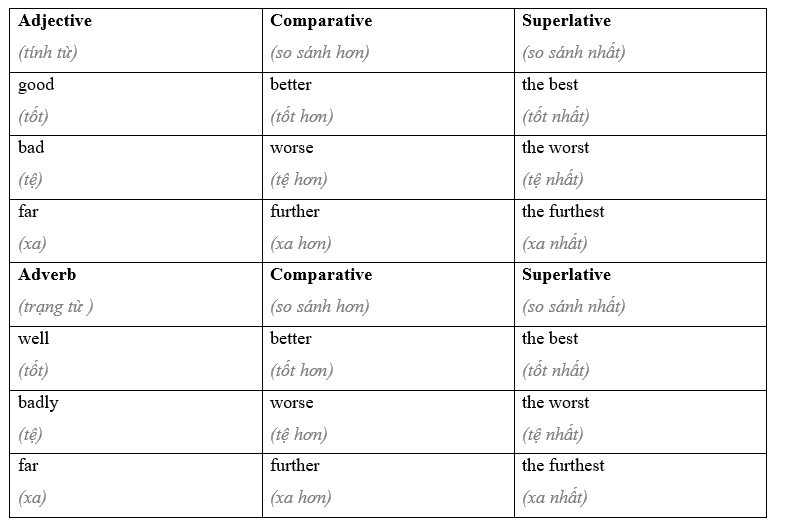
1 Correct the mistakes in the sentences.
(Sửa lỗi sai trong câu.)
1 I'm busyer today than I was yesterday.
2 He's the shortest boy of the class.
3 Kate's more short than Alice.
4 You're not as clever than me.
5 Today is longest day of the year.
2 Complete the sentences with the comparative form of the adverb in brackets and “than”.
(Hoàn thành các câu với dạng so sánh hơn của trạng từ trong ngoặc và “than”.)
1 Mum drives ____________Dad. (fast)
2 Dad drives _____________Mum. (well)
3 Fred writes _____________ Grace. (beautifully)
4 Harry works _____________ me. (slowly)
5 Pete usually arrives at school _____________ everyone else. (late)
6 Who speaks French _____________ (fluently): Dave or Bess?
5 Complete the sentences with than or as and the phrases below.
(Hoàn thành các câu với than hoặc as và các cụm từ bên dưới.)
I thought she would be
I was before
it looks from the outside
it used to be
it was when I first moved into it
there used to be
1 This part of town is much less popular than it used to be.
(Phần này của thị trấn thì ít phổ biến hơn nhiều so với trước đây.)
2 My flat isn't as charming _________________
3 The house is actually more spacious _________________
4 Kelly wasn't as late _________________
5 There are fewer contemporary buildings in the town centre _________________
6 I'm happier in my new flat _________________
Comparatives (So sánh hơn) / Superlatives (So sánh nhất)
7. Fill in the missing forms of the adjectives/ adverbs, comparatives and superlatives.
(Điền vào dạng còn thiếu của tính từ/trạng từ, so sánh hơn và so sánh nhất.)
1. large – larger – the largest
2. little – _____ – _____
3. _____ – busier – _____
4. _____ – _____ – the worst
5. hot – _____ – _____
6. _____ – _____ – the most often
7. dangerous – _____ – _____
8. _____ – more helpful – _____
9. easily – _____ – _____
10. good – _____ – _____
Modifying comparisons (Thành phần bổ nghĩa trong phép so sánh)
9. Choose the correct option.
(Chọn phương án đúng.)
1. This charity event is much/by far better than the one last year.
2. The marathon raised as/a little more money than the other charity events.
3. The musical was by far/as the best of the year.
4. The money from the charity donations isn’t as much as/than the last fundraising activity.
5. The theatre isn’t as/much old as the museum.
6. It’s a little/so faster to go to Glastonbury Festival by train than by car.
7. The drama isn’t so/much popular as the comedy at the local festival.
8. The Adopt an Animal Day was much/more better than other events at the shelter.
9. Jack is not as/much friendly as the other volunteers.
10. The comedy performance wasn’t so/a bit funny as the one we saw last month.
Mark the letter A, B, C or D on your answer sheet to indicate the correct answer to each of the following questions.
This winter wasn’t_______ as difficult as last winter.
-
A.
almost
-
B.
nearly
-
C.
closely
-
D.
just
Choose the most suitable words or phrases to fill in the blanks.
On my birthday, my father gave me a ________.
-
A.
new blue German car
-
B.
new German blue car
-
C.
blue German new car
-
D.
German new blue car
Choose the best answer.
The garden looks _____ since you tidied it up.
-
A.
better
-
B.
well
-
C.
more good
-
D.
more well
Choose the best answer.
Your English is improving. It is getting ______.
-
A.
well
-
B.
good
-
C.
much well
-
D.
clearly
Choose the best answer.
He seemed to be a bit _____ today.
-
A.
badly
-
B.
awfully
-
C.
strangely
-
D.
strange
Choose the best answer.
The fish tastes _____, I won’t eat it.
-
A.
awful
-
B.
awfully
-
C.
more awfully
-
D.
as awful
Choose the best answer.
He did not come and she looked rather _____.
-
A.
worry
-
B.
worrying
-
C.
worrier
-
D.
worried






